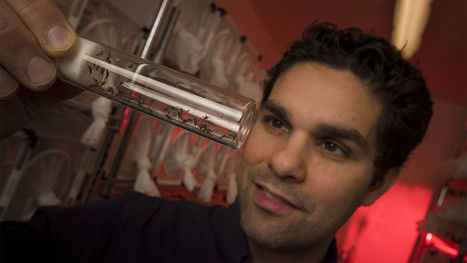Recover from dengue once, and you’re not necessarily free and clear. The mosquito-borne disease marked by fever, rash, and debilitating pain results from any of four genetically distinct versions of the dengue virus. Previously infected people who get hit with a second of these “serotypes” can face more severe, even life-threatening symptoms. Now, by endowing a line of mosquitoes with an antibody against the virus, researchers have for the first time made insects that—at least in lab tests—appear unable to spread any form of the disease. In theory, these mosquitoes could be released into the wild to suppress the circulation of the virus. “This is right on the money,” says Alexander Franz, a biologist at the University of Missouri, Columbia, who studies insect-borne viruses. “This is what you need to do if you really want to have a strong effect on dengue prevalence.”
Conventional control strategies for dengue, such as removing stagnant water where mosquitoes breed, spraying insecticides, and protecting people with bed nets, have failed to defeat the virus, which infects up to 400 million people a year in regions near the tropics. So some researchers are trying to defeat dengue from inside the mosquito that has just drunk infected blood. The goal is to keep the virus from spreading to the insect’s saliva, where it can be injected into the next person bitten....
Mosquitoes don’t make antibodies to target pathogens like we do, but giving them the ability to make one of these immune proteins could help them fight off an infection that they would otherwise pass on to people. In previous studies, researchers endowed mosquitoes that carry the malaria parasite Plasmodium with an antibody that kept the pathogen out of their saliva.
The new study applies a similar principle to the dengue virus. Molecular biologist Omar Akbari of the University of California, San Diego, and colleagues reengineered the human antidengue antibody to simplify its structure, making its gene easier to insert into the mosquito genome. They injected the slimmed-down antibody gene into the embryos of Aedes aegypti mosquitoes, which spread dengue. Then, they bred the resulting insects to make offspring with two copies of the new gene, which is activated only when blood enters the gut. After the engineered mosquitoes drank blood infected with any one of the four dengue serotypes, they had no detectable dengue virus in their saliva, the researchers report today in PLOS Pathogens.
In the lab, these genetically engineered mosquitoes could mate and produce healthy offspring. They developed slightly slower than typical mosquitoes, and the females had slightly shorter life spans, but it’s hard to gauge from these initial tests how fit these mosquitoes will be compared with their wild counterparts, Akbari says.
Overall, the work is promising, Franz says. But future tests will need to demonstrate that the dengue virus doesn’t quickly mutate and evade the antibody’s grip, and that the inserted gene is stable—able to produce the antibody in the mosquito gut generation after generation. If it does, he says, “I think this probably a winner.”
Original report Published in PLOS Pathogens (January 16, 2020):



 Your new post is loading...
Your new post is loading...








